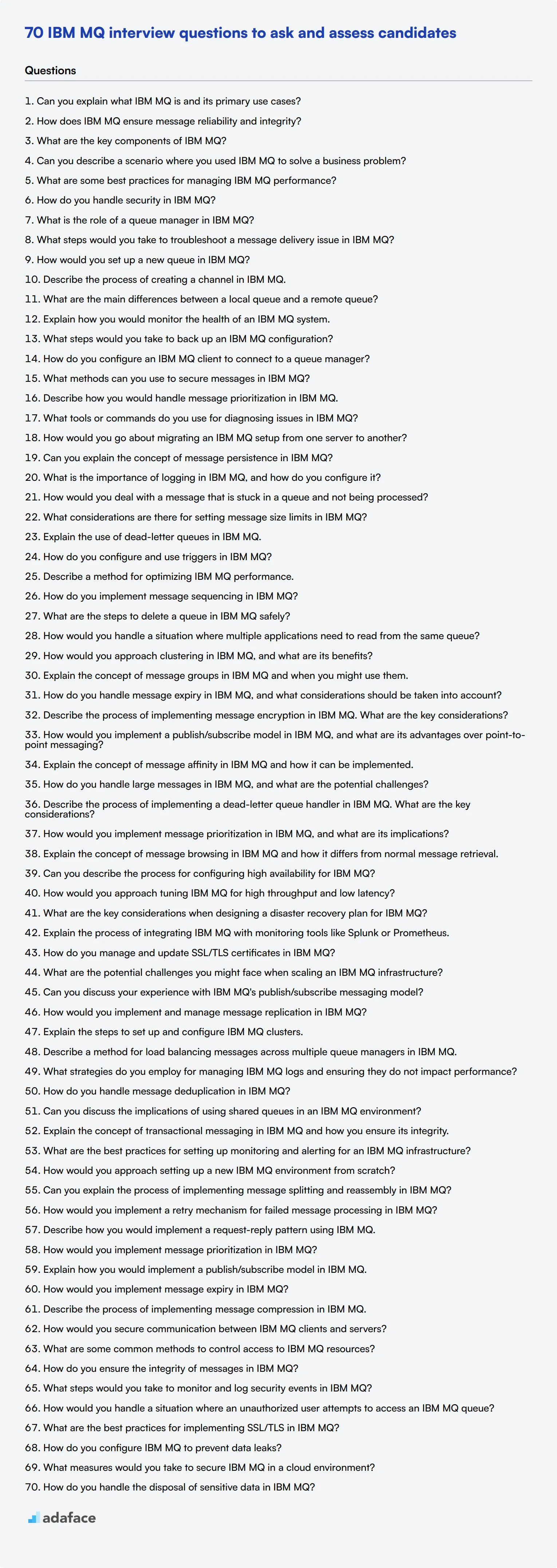Hiring the right IBM MQ administrators is crucial for maintaining efficient messaging systems in enterprise environments. Asking the right interview questions helps you evaluate candidates' knowledge and experience effectively.
This blog post provides a comprehensive list of IBM MQ interview questions categorized by experience level and specific areas of expertise. From general concepts to advanced topics, security, and processes, these questions cover a wide range of skills necessary for IBM MQ administrators.
Use these questions to assess candidates' proficiency and identify the best fit for your team. Consider combining these interview questions with a pre-employment IBM MQ skills assessment for a more thorough evaluation process.
Table of contents
8 general IBM MQ interview questions and answers to assess candidates
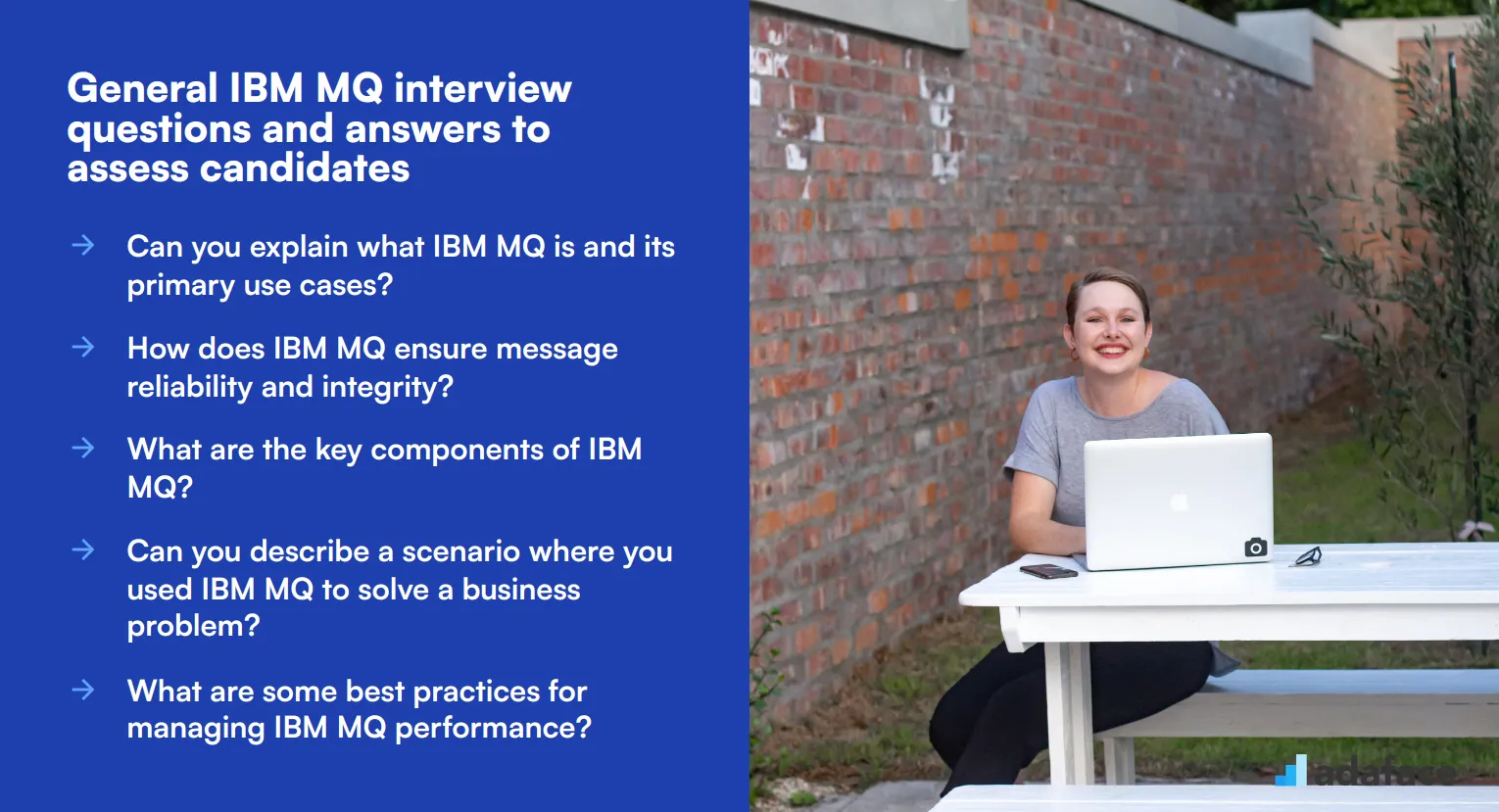
To ensure your candidates have a strong understanding of IBM MQ, these eight interview questions can help you assess their knowledge and practical experience. Use these questions to gauge their ability to handle real-world scenarios involving message queuing and middleware.
1. Can you explain what IBM MQ is and its primary use cases?
IBM MQ, formerly known as WebSphere MQ, is a messaging middleware that allows applications to communicate and exchange data. It's designed for asynchronous communication, ensuring that messages are reliably delivered even when the sender and receiver are not connected simultaneously.
Primary use cases include integrating various systems, enabling communication between microservices, and ensuring reliable message delivery in distributed applications. It's widely used in banking, retail, and other industries that require robust, secure, and reliable message handling.
Look for candidates who can articulate the core purpose of IBM MQ and provide relevant examples of its application in real-world scenarios.
2. How does IBM MQ ensure message reliability and integrity?
IBM MQ ensures message reliability and integrity through several mechanisms. It uses persistent messaging to ensure that messages are not lost even if the system crashes. Messages are stored on disk until they are successfully delivered and acknowledged by the receiver.
Additionally, IBM MQ supports transactions, allowing multiple messages to be processed as a single unit of work. If any part of a transaction fails, the entire transaction is rolled back, maintaining data consistency.
Candidates should mention both persistence and transactional support as key features that ensure message reliability and integrity.
3. What are the key components of IBM MQ?
The key components of IBM MQ include queues, queue managers, channels, and message listeners. Queues are used to store messages until they are processed. Queue managers manage the queues and ensure messages are delivered. Channels are communication pathways between different MQ systems, and message listeners are applications that wait for and process incoming messages.
Understanding these components is crucial for effectively managing and troubleshooting an IBM MQ environment.
An ideal candidate will describe these components clearly and explain their roles in the messaging system.
4. Can you describe a scenario where you used IBM MQ to solve a business problem?
In a previous role, we used IBM MQ to integrate a legacy mainframe system with a modern web application. The mainframe processed transactions and generated messages that needed to be consumed by the web application in real-time. By setting up IBM MQ, we were able to ensure reliable message delivery between the two systems, even during peak loads.
This setup significantly improved the transaction processing speed and reliability, leading to better customer satisfaction and reduced operational costs.
Look for candidates who can provide specific examples and explain the impact of their solution. This demonstrates practical experience and problem-solving skills.
5. What are some best practices for managing IBM MQ performance?
Some best practices for managing IBM MQ performance include: optimizing queue depths to avoid bottlenecks, regularly monitoring and tuning message flows, and ensuring that the underlying hardware and network infrastructure are adequate for the expected message volume.
Additionally, setting proper logging and alerting mechanisms can help quickly identify and resolve performance issues.
Candidates should demonstrate an understanding of both system-level and application-level optimizations. Mentioning specific tools or techniques for monitoring and tuning can be a plus.
6. How do you handle security in IBM MQ?
Security in IBM MQ is handled through a combination of authentication, authorization, and encryption. Authentication ensures that only authorized users can access the MQ system. Authorization controls what authenticated users can do within the system, and encryption protects data in transit.
IBM MQ supports various security protocols, including SSL/TLS for encryption and LDAP for authentication and authorization.
Candidates should describe these security mechanisms and explain how they have implemented them in previous projects. Look for a clear understanding of the importance of each security aspect.
7. What is the role of a queue manager in IBM MQ?
A queue manager in IBM MQ is responsible for managing the queues and ensuring that messages are delivered to the right queues. It handles the communication between different MQ systems and provides transactional support to ensure data consistency.
The queue manager also manages resources, such as memory and disk space, to optimize message throughput and reliability.
Candidates should explain the central role of the queue manager and highlight its importance in maintaining the overall health and performance of the MQ environment.
8. What steps would you take to troubleshoot a message delivery issue in IBM MQ?
To troubleshoot a message delivery issue in IBM MQ, I would start by checking the queue depths to ensure that messages are not piling up. Next, I would review the logs for any errors or warnings and verify that all channels are functioning correctly.
I would also check the network connectivity between the sender and receiver and ensure that all necessary permissions are in place. If the issue persists, I would use MQ's built-in diagnostic tools to trace the message flow and identify any bottlenecks or failures.
Candidates should demonstrate a systematic approach to troubleshooting, mentioning specific tools and techniques they would use. Look for a logical and methodical problem-solving process.
20 IBM MQ interview questions to ask junior administrators
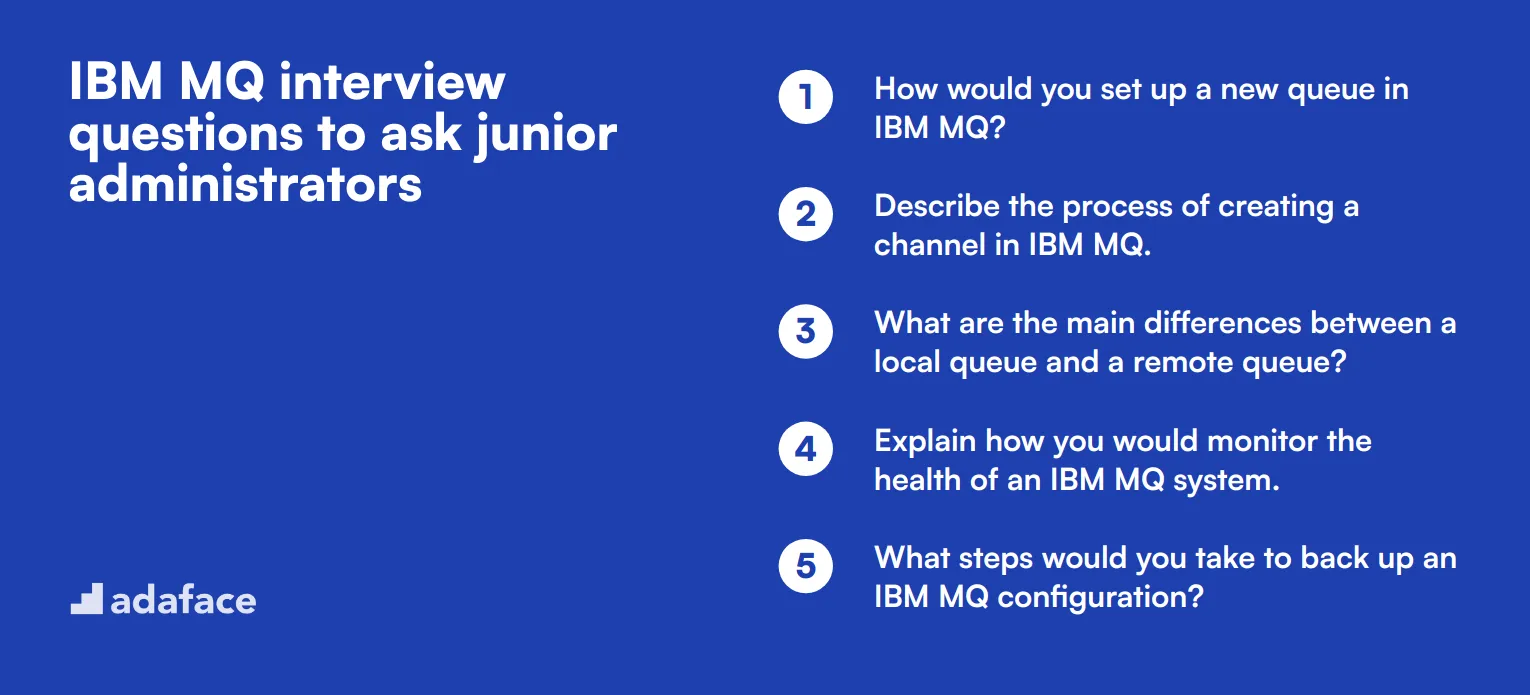
To identify whether junior administrators have the essential knowledge for handling IBM MQ, use these targeted interview questions. This list will help you assess their practical skills and understanding, ensuring they are a good fit for your team. For more on relevant job roles, check out this software engineer job description.
- How would you set up a new queue in IBM MQ?
- Describe the process of creating a channel in IBM MQ.
- What are the main differences between a local queue and a remote queue?
- Explain how you would monitor the health of an IBM MQ system.
- What steps would you take to back up an IBM MQ configuration?
- How do you configure an IBM MQ client to connect to a queue manager?
- What methods can you use to secure messages in IBM MQ?
- Describe how you would handle message prioritization in IBM MQ.
- What tools or commands do you use for diagnosing issues in IBM MQ?
- How would you go about migrating an IBM MQ setup from one server to another?
- Can you explain the concept of message persistence in IBM MQ?
- What is the importance of logging in IBM MQ, and how do you configure it?
- How would you deal with a message that is stuck in a queue and not being processed?
- What considerations are there for setting message size limits in IBM MQ?
- Explain the use of dead-letter queues in IBM MQ.
- How do you configure and use triggers in IBM MQ?
- Describe a method for optimizing IBM MQ performance.
- How do you implement message sequencing in IBM MQ?
- What are the steps to delete a queue in IBM MQ safely?
- How would you handle a situation where multiple applications need to read from the same queue?
10 intermediate IBM MQ interview questions and answers to ask mid-tier administrators
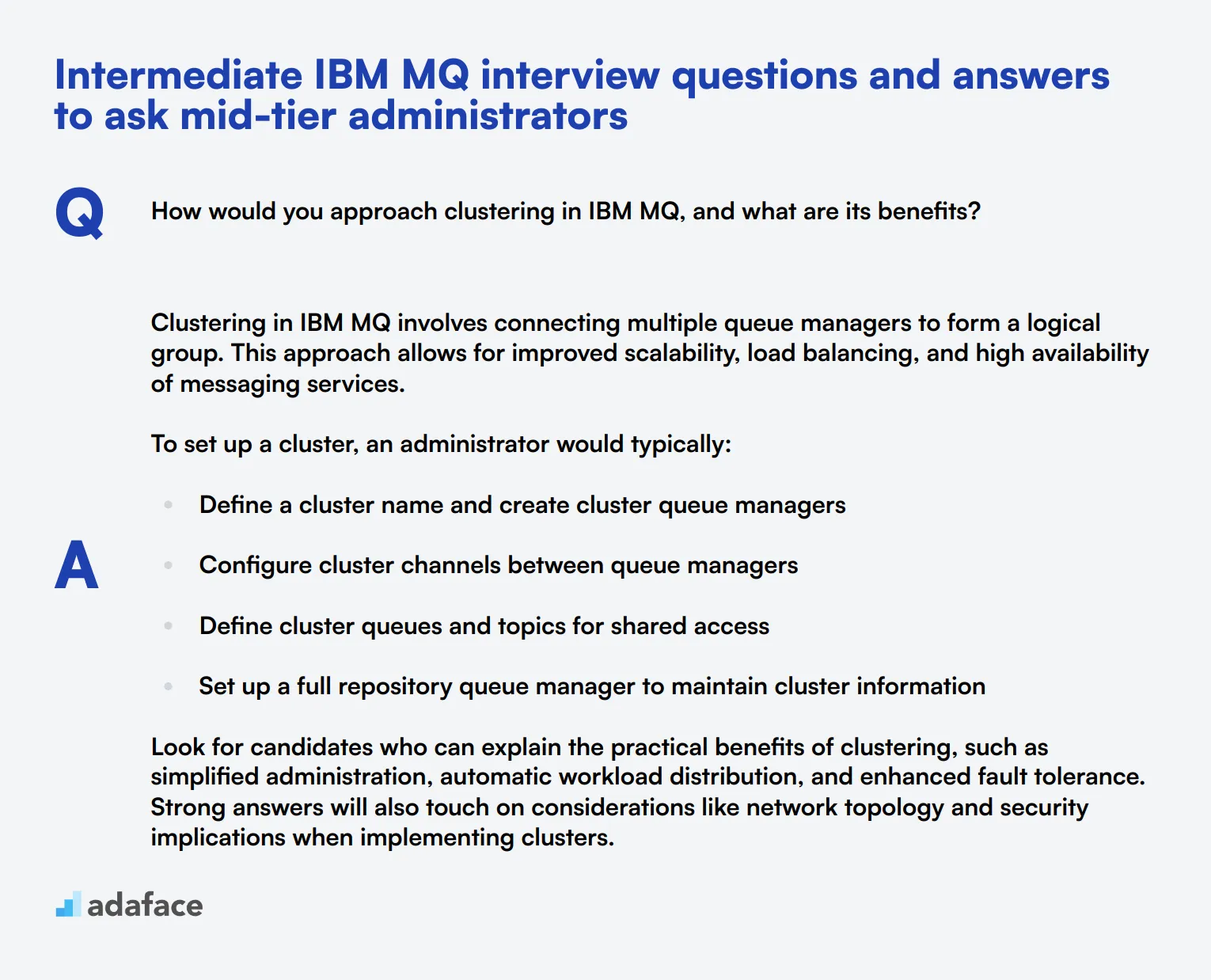
Ready to level up your IBM MQ interview game? These 10 intermediate questions are perfect for assessing mid-tier administrators. They'll help you gauge a candidate's practical knowledge and problem-solving skills without diving too deep into the technical weeds. Use these questions to spark insightful discussions and uncover the true potential of your MQ maestros!
1. How would you approach clustering in IBM MQ, and what are its benefits?
Clustering in IBM MQ involves connecting multiple queue managers to form a logical group. This approach allows for improved scalability, load balancing, and high availability of messaging services.
To set up a cluster, an administrator would typically:
- Define a cluster name and create cluster queue managers
- Configure cluster channels between queue managers
- Define cluster queues and topics for shared access
- Set up a full repository queue manager to maintain cluster information
Look for candidates who can explain the practical benefits of clustering, such as simplified administration, automatic workload distribution, and enhanced fault tolerance. Strong answers will also touch on considerations like network topology and security implications when implementing clusters.
2. Explain the concept of message groups in IBM MQ and when you might use them.
Message groups in IBM MQ are a way to logically associate multiple messages that belong together. This feature ensures that related messages are processed in the correct order and by the same consumer.
Key points about message groups include:
- Messages in a group share a common group ID
- The first message is marked as the start of the group
- The last message is marked as the end of the group
- Intermediate messages are marked as neither start nor end
Message groups are particularly useful in scenarios such as:
- Processing large data sets that are split across multiple messages
- Maintaining transaction integrity for multi-step operations
- Ensuring ordered processing of related events or updates
A strong candidate should be able to provide real-world examples of when they've used message groups and discuss the benefits and potential challenges of implementing them in a production environment.
3. How do you handle message expiry in IBM MQ, and what considerations should be taken into account?
Message expiry in IBM MQ is a mechanism to ensure that messages don't remain in the system indefinitely if they're not processed within a specified timeframe. Handling message expiry involves setting appropriate expiry intervals and configuring how expired messages are managed.
Key aspects of handling message expiry include:
- Setting the 'Expiry' field when putting messages on a queue
- Configuring queue managers to check for expired messages
- Deciding whether to discard expired messages or move them to a dead-letter queue
- Monitoring and analyzing expiry patterns to optimize system performance
When evaluating responses, look for candidates who consider factors such as:
- The nature of the application and criticality of messages
- System performance implications of frequent expiry checks
- Strategies for handling expired messages in different scenarios
- Balancing between timely message processing and avoiding unnecessary message loss
A thorough answer will demonstrate an understanding of how message expiry affects overall system reliability and efficiency in real-world messaging scenarios.
4. Describe the process of implementing message encryption in IBM MQ. What are the key considerations?
Implementing message encryption in IBM MQ involves protecting the content of messages as they travel through the messaging system. This process typically includes:
- Choosing an appropriate encryption algorithm (e.g., AES)
- Setting up a key management system for generating and distributing encryption keys
- Configuring queue managers and channels to use SSL/TLS for secure communications
- Implementing application-level encryption for sensitive message content
Key considerations when implementing message encryption include:
- Performance impact of encryption and decryption operations
- Key management and rotation policies
- Compliance with industry standards and regulations
- Interoperability with other systems and applications
Look for candidates who can discuss both the technical aspects of encryption and the broader implications for system design and operations. Strong answers will touch on balancing security needs with performance requirements and demonstrate awareness of potential challenges in managing encrypted messaging systems at scale.
5. How would you implement a publish/subscribe model in IBM MQ, and what are its advantages over point-to-point messaging?
Implementing a publish/subscribe model in IBM MQ involves setting up a system where publishers can send messages to topics, and subscribers can receive messages from those topics without direct knowledge of the publishers. The process typically includes:
- Defining topics and topic hierarchies
- Creating subscription queues for subscribers
- Configuring publishers to send messages to topics
- Setting up subscribers to receive messages from their subscription queues
Advantages of publish/subscribe over point-to-point messaging include:
- Decoupling of publishers and subscribers
- Improved scalability for distributing messages to multiple recipients
- Greater flexibility in adding or removing subscribers without affecting publishers
- Enhanced ability to implement complex routing and filtering scenarios
When evaluating responses, look for candidates who can explain how publish/subscribe can be used to solve real-world messaging challenges. Strong answers will discuss considerations such as message persistence, subscriber durability, and strategies for managing high-volume topic hierarchies.
6. Explain the concept of message affinity in IBM MQ and how it can be implemented.
Message affinity in IBM MQ refers to the requirement that certain messages must be processed by the same queue manager or application instance. This concept is important when dealing with related messages that need to maintain context or state across multiple interactions.
Implementing message affinity can involve several techniques:
- Using message properties to tag related messages
- Configuring workload balancing to route affinity messages consistently
- Employing message groups to ensure ordered processing
- Utilizing correlation IDs to link related messages
Candidates should be able to discuss scenarios where message affinity is crucial, such as in stateful transactions or session-based communications. Look for answers that demonstrate understanding of the trade-offs between maintaining affinity and achieving optimal load balancing. Strong responses will also touch on potential challenges in implementing affinity in distributed or highly available systems.
7. How do you handle large messages in IBM MQ, and what are the potential challenges?
Handling large messages in IBM MQ requires careful consideration of system resources and performance implications. Strategies for managing large messages include:
- Configuring appropriate maximum message sizes for queues and channels
- Using message segmentation to break large messages into smaller chunks
- Implementing file transfer protocols for very large data transfers
- Optimizing buffer sizes and other performance-related settings
Potential challenges when dealing with large messages include:
- Increased memory and storage requirements
- Longer processing times and potential bottlenecks
- Complexity in handling partially received or segmented messages
- Network bandwidth considerations, especially in distributed systems
Look for candidates who can discuss real-world scenarios they've encountered with large message handling. Strong answers will demonstrate an understanding of the balance between accommodating large messages and maintaining overall system performance and reliability. Candidates should also be able to suggest alternative approaches, such as using message references or external storage solutions for extremely large payloads.
8. Describe the process of implementing a dead-letter queue handler in IBM MQ. What are the key considerations?
Implementing a dead-letter queue (DLQ) handler in IBM MQ involves creating a mechanism to process messages that cannot be delivered to their intended destination. The process typically includes:
- Configuring a dead-letter queue for the queue manager
- Implementing a DLQ handler application to process undeliverable messages
- Setting up rules for message routing and retry attempts
- Establishing monitoring and alerting for DLQ activity
Key considerations for implementing a DLQ handler include:
- Determining appropriate retry policies for different types of failures
- Implementing logging and error reporting mechanisms
- Deciding on strategies for handling persistent vs. non-persistent messages
- Ensuring the DLQ handler itself is robust and fault-tolerant
When evaluating responses, look for candidates who understand the importance of DLQ handling in maintaining system reliability and data integrity. Strong answers will discuss strategies for analyzing and resolving common causes of message undeliverability, as well as approaches for scaling DLQ handling in high-volume environments.
9. How would you implement message prioritization in IBM MQ, and what are its implications?
Implementing message prioritization in IBM MQ involves configuring the system to process higher-priority messages before lower-priority ones. This can be achieved through:
- Setting priority levels (0-9) on individual messages
- Configuring queues to support priority-based message retrieval
- Implementing application logic to handle messages based on their priority
- Using priority queues for automatic prioritization of messages
Implications of implementing message prioritization include:
- Potential for lower-priority messages to experience delays or starvation
- Increased complexity in queue management and monitoring
- Performance overhead for priority-based message retrieval
- Challenges in balancing prioritization with other quality of service requirements
Look for candidates who can discuss real-world scenarios where message prioritization is beneficial, such as in systems handling both critical and non-critical messages. Strong answers will demonstrate an understanding of the trade-offs involved in prioritization and suggest strategies for mitigating potential issues like message starvation or system overhead.
10. Explain the concept of message browsing in IBM MQ and how it differs from normal message retrieval.
Message browsing in IBM MQ allows applications to view messages on a queue without removing them. This feature is useful for inspecting message content, monitoring queue status, or implementing preview functionality without affecting message processing.
Key aspects of message browsing include:
- Messages remain on the queue after browsing
- Multiple applications can browse the same message simultaneously
- Browsing doesn't change the order of messages on the queue
- Browsed messages can still be retrieved normally by other applications
Differences from normal message retrieval:
- Retrieval removes the message from the queue; browsing does not
- Retrieved messages are typically locked to prevent concurrent access; browsed messages are not
- Normal retrieval can trigger subsequent processing workflows; browsing is typically passive
When evaluating responses, look for candidates who can explain practical use cases for message browsing, such as implementing audit trails or diagnostic tools. Strong answers will also discuss potential performance implications of frequent browsing operations and strategies for efficiently implementing browsing in high-volume messaging systems.
15 advanced IBM MQ interview questions to ask senior administrators
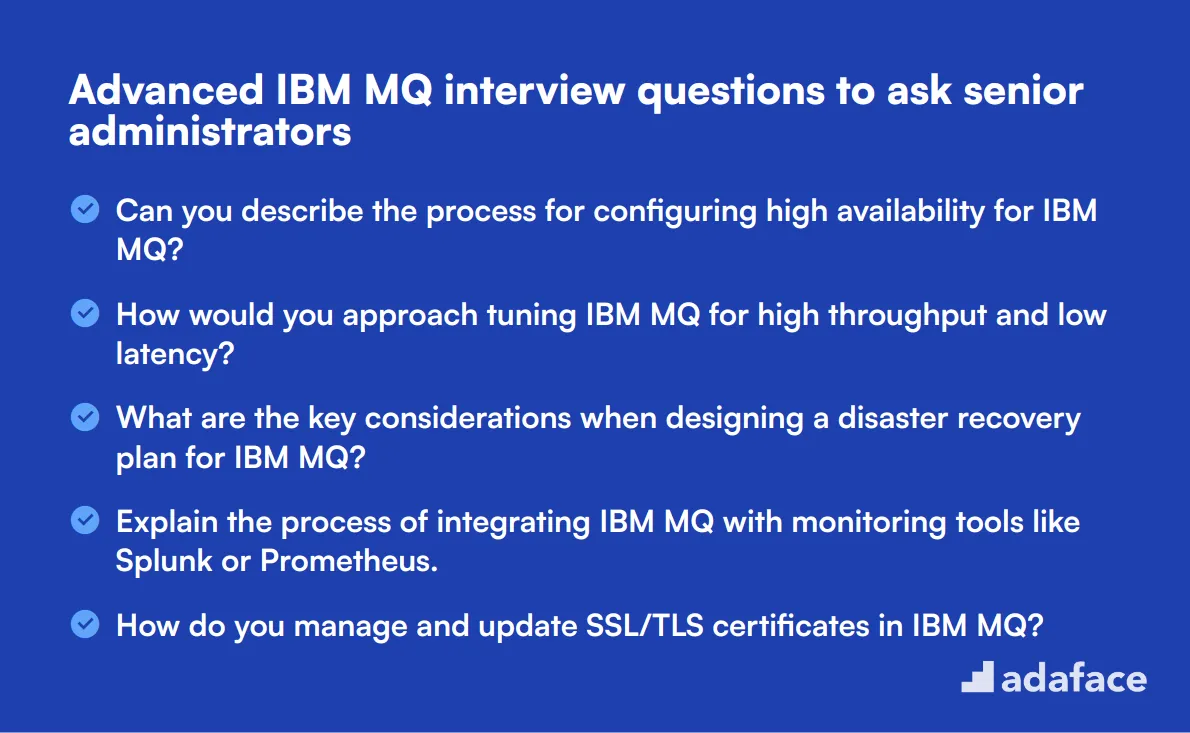
To ensure you hire top-notch senior administrators, use these advanced IBM MQ interview questions. They help assess candidates' deep technical knowledge and problem-solving skills, which are essential for managing complex messaging environments. For more insights on creating effective job descriptions, check out this software engineer job description.
- Can you describe the process for configuring high availability for IBM MQ?
- How would you approach tuning IBM MQ for high throughput and low latency?
- What are the key considerations when designing a disaster recovery plan for IBM MQ?
- Explain the process of integrating IBM MQ with monitoring tools like Splunk or Prometheus.
- How do you manage and update SSL/TLS certificates in IBM MQ?
- What are the potential challenges you might face when scaling an IBM MQ infrastructure?
- Can you discuss your experience with IBM MQ's publish/subscribe messaging model?
- How would you implement and manage message replication in IBM MQ?
- Explain the steps to set up and configure IBM MQ clusters.
- Describe a method for load balancing messages across multiple queue managers in IBM MQ.
- What strategies do you employ for managing IBM MQ logs and ensuring they do not impact performance?
- How do you handle message deduplication in IBM MQ?
- Can you discuss the implications of using shared queues in an IBM MQ environment?
- Explain the concept of transactional messaging in IBM MQ and how you ensure its integrity.
- What are the best practices for setting up monitoring and alerting for an IBM MQ infrastructure?
8 IBM MQ interview questions and answers related to processes
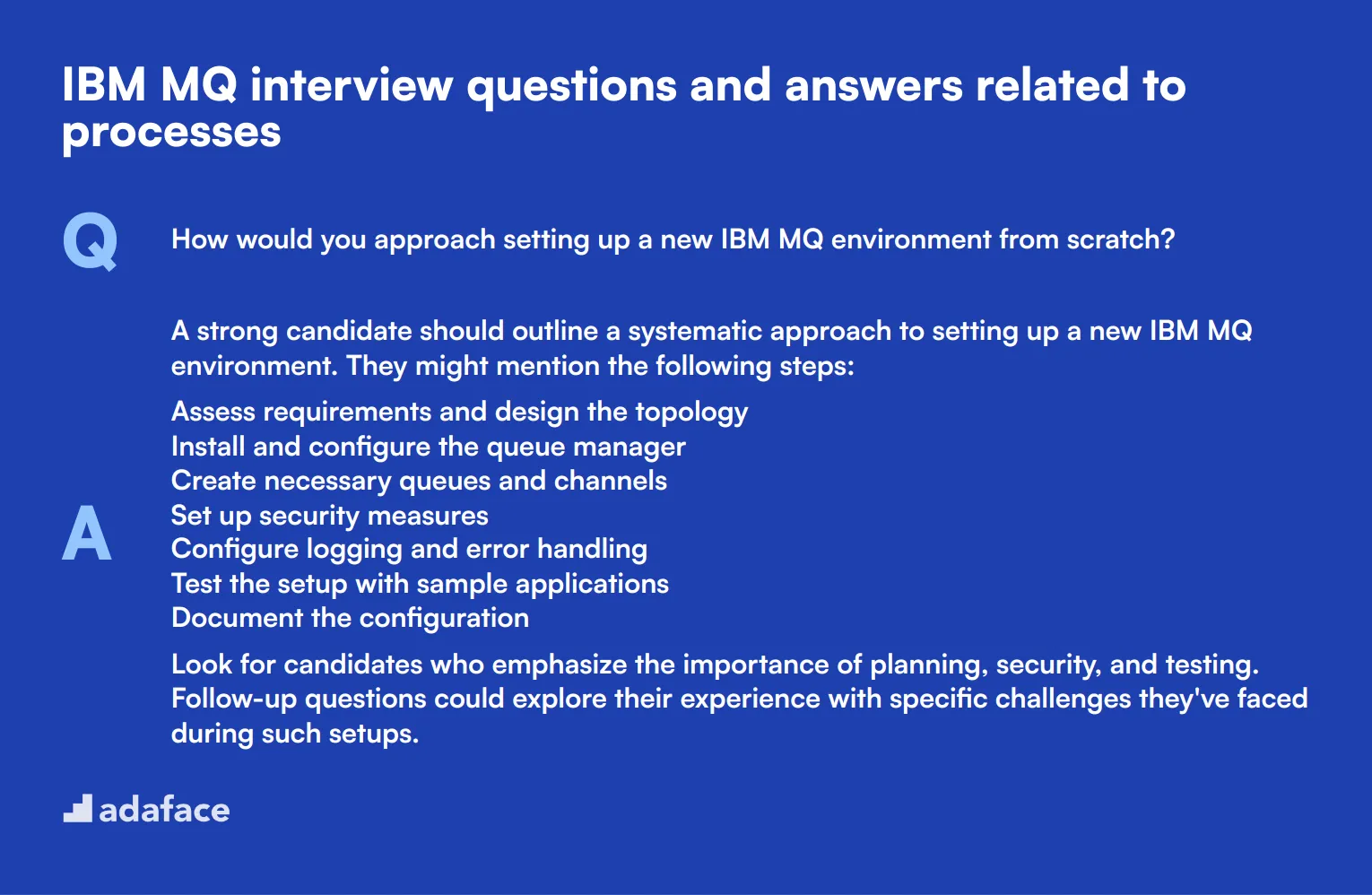
When interviewing candidates for IBM MQ roles, it's crucial to assess their understanding of key processes. These questions will help you gauge a candidate's practical knowledge and problem-solving skills in real-world MQ scenarios. Use them to identify applicants who can hit the ground running and contribute effectively to your team dynamics.
1. How would you approach setting up a new IBM MQ environment from scratch?
A strong candidate should outline a systematic approach to setting up a new IBM MQ environment. They might mention the following steps:
- Assess requirements and design the topology
- Install and configure the queue manager
- Create necessary queues and channels
- Set up security measures
- Configure logging and error handling
- Test the setup with sample applications
- Document the configuration
Look for candidates who emphasize the importance of planning, security, and testing. Follow-up questions could explore their experience with specific challenges they've faced during such setups.
2. Can you explain the process of implementing message splitting and reassembly in IBM MQ?
A knowledgeable candidate should be able to describe the process of splitting large messages and reassembling them at the destination. They might explain:
• Message splitting is used when a message exceeds the maximum transmission segment size • The sending application splits the message into smaller segments • Each segment is sent as a separate message with a segment header • The receiving application reassembles the segments based on the segment headers • IBM MQ provides built-in support for this through its segmentation feature
Look for candidates who understand the implications of message splitting on performance and error handling. Ask follow-up questions about how they would handle scenarios where segments are lost or received out of order.
3. How would you implement a retry mechanism for failed message processing in IBM MQ?
An experienced candidate should be able to outline a robust retry mechanism. They might describe an approach like this:
- Configure a backout queue for messages that fail processing
- Set a backout threshold on the main queue
- When a message fails, increase its backout count
- If the backout count exceeds the threshold, move the message to the backout queue
- Implement a separate process to handle messages in the backout queue
- This process could attempt reprocessing after a delay or notify an administrator
Pay attention to candidates who discuss the importance of logging, monitoring, and alerting in this process. Consider asking about their experience in tuning retry intervals and thresholds for different types of applications.
4. Describe how you would implement a request-reply pattern using IBM MQ.
A competent candidate should be able to explain the request-reply pattern implementation in IBM MQ. They might outline the following steps:
- Create two queues: one for requests and one for replies
- The requester puts a message on the request queue with a unique correlation ID
- The responder gets the message from the request queue
- The responder processes the request and puts a reply on the reply queue
- The reply message uses the correlation ID from the request
- The requester waits for or polls the reply queue for a message with the matching correlation ID
Look for candidates who mention the importance of timeout handling and error scenarios. You might ask follow-up questions about how they would handle scenarios with multiple responders or load balancing.
5. How would you implement message prioritization in IBM MQ?
A knowledgeable candidate should be able to explain the concept of message prioritization and how to implement it in IBM MQ. They might describe the process as follows:
- Configure the queue to support message priorities (usually 0-9, with 9 being highest)
- Set the priority when putting messages on the queue
- IBM MQ will automatically retrieve messages in priority order
- For applications, use MQPMO_PRIORITY option when putting messages
- Consider using priority queues for high-priority messages
Look for candidates who understand the implications of prioritization on message ordering and performance. Ask follow-up questions about how they would handle scenarios where low-priority messages might be starved of processing time.
6. Explain how you would implement a publish/subscribe model in IBM MQ.
A skilled candidate should be able to describe the publish/subscribe model and its implementation in IBM MQ. They might outline the process as follows:
- Create a topic object to represent the subject of publications
- Publishers send messages to the topic
- Subscribers express interest in topics using subscriptions
- IBM MQ manages the distribution of messages from publishers to subscribers
- Use administrative tools or APIs to manage topics and subscriptions
Look for candidates who understand the benefits of publish/subscribe over point-to-point messaging, such as decoupling publishers from subscribers. Consider asking about their experience with handling different Quality of Service levels in pub/sub scenarios.
7. How would you implement message expiry in IBM MQ?
An experienced candidate should be able to explain the concept of message expiry and how to implement it in IBM MQ. They might describe the process as follows:
- Set the Expiry field in the MQMD (Message Descriptor) when putting a message
- The expiry time is specified in tenths of a second
- IBM MQ will automatically discard expired messages when they are retrieved
- Configure a dead-letter queue to handle expired messages if needed
- Use the MQRO_EXPIRATION_WITH_FULL_RESPONSE report option for notifications
Look for candidates who understand the implications of message expiry on system performance and message guarantees. Ask follow-up questions about how they would handle scenarios where expired messages need to be audited or reprocessed.
8. Describe the process of implementing message compression in IBM MQ.
A knowledgeable candidate should be able to explain the benefits and implementation of message compression in IBM MQ. They might outline the process as follows:
- Enable message compression at the queue level
- Set the MQMD_COMPRESS_* flag when putting messages
- IBM MQ automatically compresses messages before transmission
- The receiving end decompresses messages automatically
- Monitor compression ratios and performance impact
Look for candidates who understand the trade-offs between reduced network usage and increased CPU usage. Consider asking about their experience with different compression algorithms and how they would choose the appropriate one for different scenarios.
9 IBM MQ interview questions and answers related to security
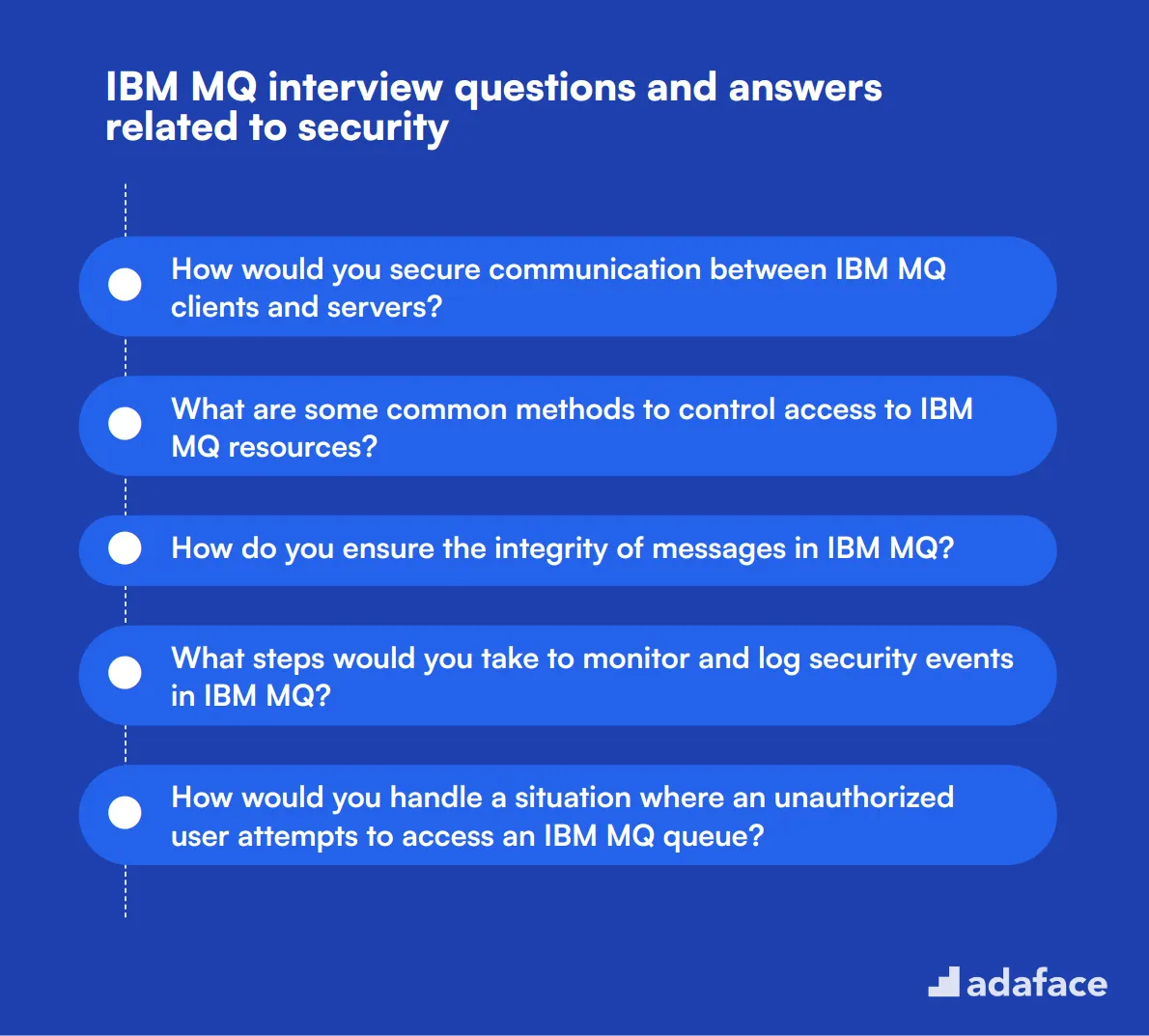
When interviewing for roles that involve working with IBM MQ, ensuring that candidates have a solid understanding of security principles is crucial. This section provides a set of questions specifically focused on IBM MQ security to help you gauge the applicant's knowledge and readiness.
1. How would you secure communication between IBM MQ clients and servers?
To secure communication between IBM MQ clients and servers, one can use SSL/TLS protocols. These protocols help encrypt the data transmitted between the client and the server, ensuring that unauthorized parties cannot intercept or tamper with the messages.
A strong answer should mention configuring SSL/TLS certificates on both the client and server sides. Additionally, the candidate should be aware of setting up authentication mechanisms to verify the identities of communicating parties. Look for candidates who emphasize the role of proper key management and regular updates to security protocols.
2. What are some common methods to control access to IBM MQ resources?
Common methods to control access to IBM MQ resources include using object-level permissions and defining roles and policies. These permissions can be set using IBM MQ's built-in security features, such as user authentication and authorization controls.
Candidates should mention the importance of using user groups and assigning appropriate permissions to these groups. Ideal responses will also touch on the need for regular audits and reviews of access controls to ensure compliance with security policies. For deeper insights into security roles, you can refer to this resource.
3. How do you ensure the integrity of messages in IBM MQ?
Ensuring the integrity of messages in IBM MQ involves implementing message hashing and digital signatures. These techniques help verify that the message has not been altered during transmission.
A good candidate will mention the use of cryptographic algorithms to generate hashes and how digital signatures can be used to authenticate the sender. They might also bring up the importance of end-to-end encryption and the role of secure transports in maintaining message integrity. Watch for a comprehensive understanding of these concepts and their practical application in IBM MQ environments.
4. What steps would you take to monitor and log security events in IBM MQ?
Monitoring and logging security events in IBM MQ can be achieved by enabling audit logs and configuring security event monitoring tools. This helps in tracking unauthorized access attempts and other security-related incidents.
The candidate should describe setting up IBM MQ's built-in logging features and integrating them with external monitoring tools like Splunk or Prometheus. They should also mention the importance of regularly reviewing these logs and setting up alerts for critical security events. This demonstrates their proactive approach to maintaining a secure IBM MQ environment.
5. How would you handle a situation where an unauthorized user attempts to access an IBM MQ queue?
In the event of an unauthorized access attempt, the first step is to isolate the incident by temporarily restricting access to the affected resources. Next, a thorough investigation should be conducted to identify the source and method of the intrusion.
The candidate should highlight the importance of reviewing access logs and implementing additional security measures, such as updating access controls and conducting a security audit. A strong response will also mention the need for notifying relevant stakeholders and possibly revoking compromised credentials to prevent future incidents.
6. What are the best practices for implementing SSL/TLS in IBM MQ?
Best practices for implementing SSL/TLS in IBM MQ include using strong encryption algorithms, regularly updating SSL/TLS certificates, and ensuring proper certificate management. It is also vital to configure mutual authentication between clients and servers.
Candidates should emphasize the importance of staying updated with the latest security patches and recommendations from IBM. They should also mention periodic security reviews and testing to ensure that SSL/TLS configurations remain robust against emerging threats. Look for a comprehensive understanding of SSL/TLS implementation and maintenance.
7. How do you configure IBM MQ to prevent data leaks?
To prevent data leaks in IBM MQ, it is essential to implement data encryption both in transit and at rest. Additionally, access controls should be strictly enforced to ensure that only authorized users can access sensitive data.
Candidates should discuss configuring message encryption and using secure channels for data transmission. They should also highlight the importance of regular access audits and monitoring for any unusual activity. An ideal response will demonstrate a proactive approach to protecting data within the IBM MQ environment.
8. What measures would you take to secure IBM MQ in a cloud environment?
Securing IBM MQ in a cloud environment involves using virtual private networks (VPNs) to isolate the MQ infrastructure, implementing robust access controls, and ensuring compliance with cloud provider security guidelines.
Candidates should mention the importance of encryption, both in transit and at rest, and the use of security groups and firewalls to limit access. They should also discuss the need for regular security assessments and updates to cloud security policies. Look for a thorough understanding of cloud-specific security challenges and solutions.
9. How do you handle the disposal of sensitive data in IBM MQ?
Disposing of sensitive data in IBM MQ involves securely deleting messages and ensuring that no residual data remains on the system. This can be achieved by using secure deletion methods and overwriting data multiple times.
Candidates should describe the steps for securely removing data from queues and mention the importance of following organizational policies for data disposal. They should also highlight the need for regular audits to ensure compliance with data protection regulations. An ideal response will demonstrate meticulous attention to secure data handling practices.
Which IBM MQ skills should you evaluate during the interview phase?
While it's impossible to fully gauge a candidate's capabilities in one interview, focusing on key IBM MQ skills can significantly streamline the hiring process. Below we explore the core skills that are most indicative of a candidate's potential success in managing IBM MQ environments.
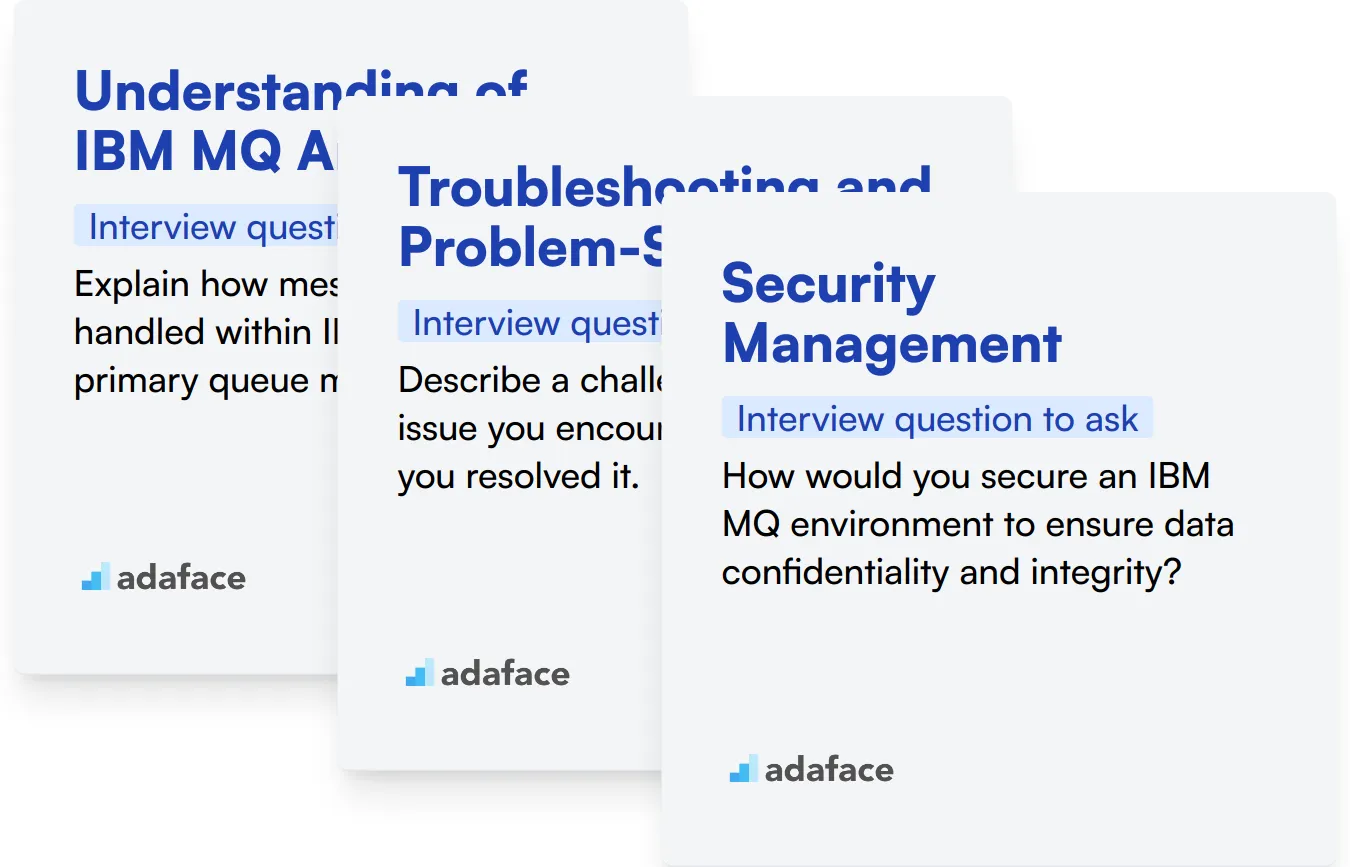
Understanding of IBM MQ Architecture
A deep understanding of IBM MQ architecture is foundational for any role involving this technology. It includes knowledge of queue managers, queues, channels, and message properties. This knowledge ensures the candidate can effectively design, implement, and troubleshoot IBM MQ systems.
Evaluating this skill through a set of MCQs can help filter candidates who possess theoretical knowledge and practical understanding before the interview.
To assess this skill in an interview, consider posing a question that tests their practical application knowledge.
Explain how messages are handled within IBM MQ when a primary queue manager fails.
Look for answers that mention failover mechanisms, the role of secondary queue managers, and the use of channels for rerouting messages. This shows a practical understanding of IBM MQ's architecture.
Troubleshooting and Problem-Solving
Troubleshooting is critical when working with complex systems like IBM MQ. The ability to identify and resolve issues quickly ensures minimal disruption to business processes.
To dive deeper into their problem-solving skills during the interview, you can use the following question:
Describe a challenging IBM MQ issue you encountered and how you resolved it.
Candidates should demonstrate a systematic approach to problem-solving and the ability to apply their technical knowledge practically. Effective communication of their thought process is also a key indicator of their expertise.
Security Management
Security management within IBM MQ is vital to protect data integrity and prevent unauthorized access. This involves configuring SSL/TLS, setting up proper user authentication, and understanding the security implications of different settings.
A focused question on security can provide insights into their awareness and proficiency in securing IBM MQ environments:
How would you secure an IBM MQ environment to ensure data confidentiality and integrity?
Answers should include specifics about encryption, channel security, and access controls. The detail and depth of the response can reveal the candidate’s proficiency in IBM MQ’s security features.
3 Tips for Effectively Using IBM MQ Interview Questions
Before you begin implementing the insights gained from this guide, here are some essential tips to enhance your interview process.
1. Utilize Skills Tests Before Interviews
Incorporating skills tests before interviews helps ensure that candidates possess the necessary abilities for the role. These tests can reveal a candidate's true proficiency and help filter out those who may not meet the technical requirements.
For IBM MQ, consider using our IBM AIX Online Test or IBM WebSphere Online Test to evaluate relevant skills. This approach not only saves time during the interview process but also provides a benchmark for candidate capabilities.
By effectively using these tests, you streamline the selection process and focus on candidates who truly align with the job demands. This leads to better hiring decisions, setting the stage for the next tip.
2. Compile Relevant Interview Questions
Choosing the right questions is critical, as you won't have time to ask too many during the interview. Prioritizing a select number of relevant questions can maximize your effectiveness in assessing candidates' competencies.
Alongside your IBM MQ questions, consider incorporating other relevant technical inquiries or soft skills questions, such as communication or teamwork. Explore additional resources for questions on communication skills or technical skills.
This focused approach will enhance your evaluation of candidates on important fronts, enabling you to identify the best fits for your team.
3. Ask Follow-Up Questions
Simply asking initial interview questions may not suffice. Candidates might provide surface-level answers or even misrepresent their true capabilities, necessitating thoughtful follow-up questions.
For example, if you ask a candidate about handling IBM MQ message persistence, a useful follow-up might be, 'Can you explain a situation where you had to troubleshoot a message delivery issue?' This encourages deeper insight into their experience and problem-solving skills, revealing their true depth of knowledge.
Use IBM MQ interview questions and skill tests to hire talented administrators
If you are looking to hire someone with IBM MQ skills, you need to ensure they have these skills accurately. The best way to do this is to use skill tests. For example, you can check out our IBM WebSphere Online Test or RabbitMQ Online Test.
Once you use these tests, you can shortlist the best applicants and call them for interviews. To get started, head over to our test library or sign up to create your first assessment.
IBM AIX Online Test
Download IBM MQ interview questions template in multiple formats
IBM MQ Interview Questions FAQs
IBM MQ interview questions should cover general knowledge, junior to senior-level administration, processes, and security.
Ask about their past projects, specific challenges they faced, and how they resolved issues in IBM MQ environments.
A good IBM MQ administrator should have strong problem-solving skills, deep knowledge of IBM MQ, and experience in managing MQ environments.
Process-related questions help assess a candidate's understanding of IBM MQ operations, efficiency, and best practices.
Security-related questions ensure candidates have the necessary knowledge to protect and secure the IBM MQ environment.
Yes, these questions are suitable for both in-person and remote interviews, helping you gauge the candidate's expertise effectively.

40 min skill tests.
No trick questions.
Accurate shortlisting.
We make it easy for you to find the best candidates in your pipeline with a 40 min skills test.
Try for freeRelated posts
Free resources




